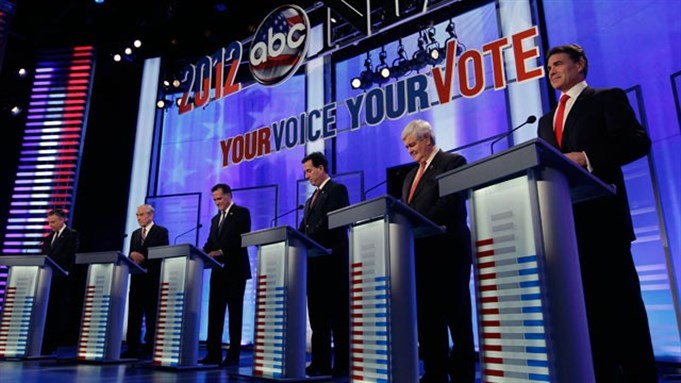Just ten days before the second anniversary of the 25 January revolution, Egyptians awoke to another railway tragedy. A train loaded beyond its capacity with security forces recruits heading from Sohag to Cairo derailed in the Badrashin area of Giza leaving nineteen dead and over 120 injured, adding to the toll of deaths on train tracks in Egypt. It was only a month earlier that a rushing train in Asyut obliterated a bus full of children, killing fifty of them.
In the late night hours of 14 January, Badrashin was awoken by the news of the tragedy. Those who had arose to attend to their morning prayers were called upon to act as rescue workers to save the many who were trapped under the train. In a span of minutes, residents of the nearby areas began to stream out of their homes to help at the site of the incident. Under the cover of darkness, with makeshift lighting, the people of Badrashin performed heroics in the absence of any state intervention. They were picking up the bodies of the deceased, collecting their belongings, attending to the injured, and collectively attempting to lift tons of twisted metal with their bare hands to save those trapped underneath the body of the train. The absence of the state`s emergency and transportation service was ominously eery.
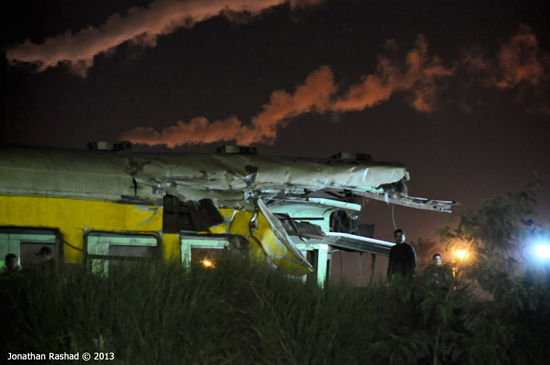
[The young police recruits were crammed in like sardines, approximately 200 per car, when the train derailed. Photo by Jonathan Rashad]
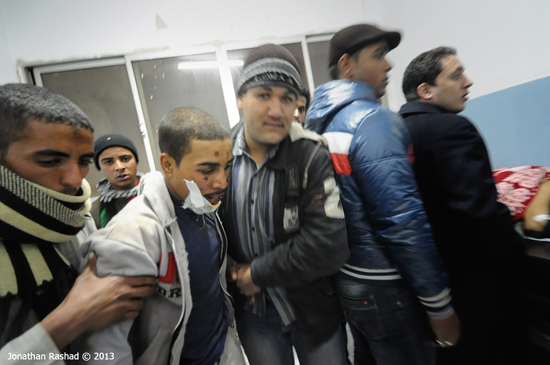
[Due to the delayed response of rescue officials and workers, the people of Badrashin rushed
the injured to the hospitals themselves. Photo by Jonathan Rashad]
In Egypt, like anywhere else, accidents happen. But in Egypt, they happen again, and again, and again, and yet again. The Badrashin incident will likely not be the last of the train tragedies in a country where the national average has become one railroad catastrophe per month. What is even more worrisome than the knowledge of impending disaster is the inanities of those who either do not know of it or actively conceal it. A newly-minted Minister of Transportation took a call from a television station on the morning of the Badrashin bloodshed where he mumbled through the answers, said nothing about rescue teams being available on site, and lazily ignored the calls for heavy vehicles to lift the body of the train to rescue survivors relayed to him by the anchor. Lacking in any sympathy, or even tokenistic commiseration, the Minister’s tone spoke to the obliviousness of those in power today in Egypt.
The nearby Hawamdiya Hospital was the recipient of the injured soldiers. Understaffed, underserviced, unsanitary, and woefully ill-equipped to handle such an influx of emergency cases, the hospital staff left the young soldiers strewn throughout the rooms, sometimes two to a bed. The images circulating online and in the news of their pain and misery at the hospital shined some light on a facility that would have otherwise never been given any distinct attention. Not only was the country’s ailing railway system on display, its healthcare institutions, laid to waste by the double-punch of decade of systematic neglect and worsening mismanagement under the Morsi government, were in full view.
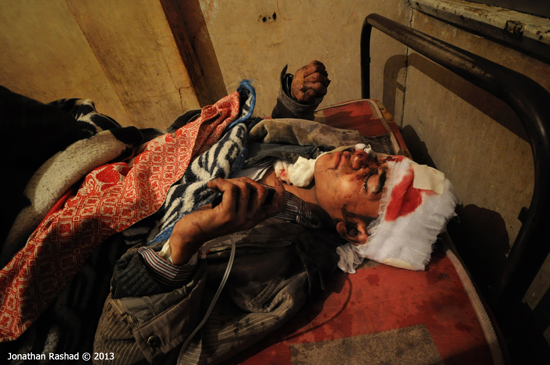
[Images from Hawamdiya Hospital where the injured had been rushed showcased
shocking conditions of healthcare facilities. Photo by Jonathan Rashad]
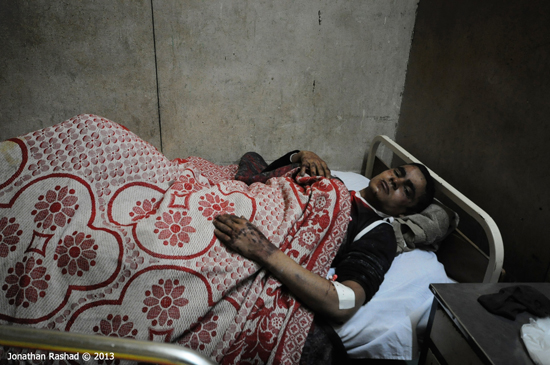
[In the absence of even a pillow, this injured soldier had to roll up items of clothing to rest
his head at Hawamdiya Hospital. Photo by Jonathan Rashad]
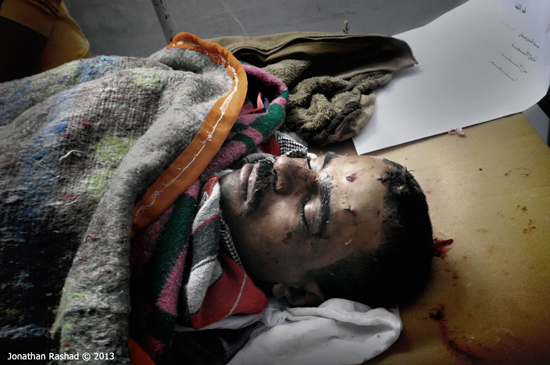
[Injured soldier from Badrashin accident receiving treatment and Hawamdiya Hospital. Photo by Jonathan Rashad]
So cataclysmically destructive was this incident for the government’s public image that they moved swiftly to try and counter the barrage of negative media coverage. President Morsi was rushed to Maadi Military Hospital in Cairo, where some of the injured had allegedly been transferred. He posed for photos with the injured in the comparatively advanced, clean, and presentable medical facility so as to showcase the exceptional treatment being doled out to the recruits. The Presidency subsequently distributed these photos to the press corps for wide distribution. Prime Minister Hisham Kandil, also on site, had his photo taken while donating blood. This too was distributed by the PM’s office to the media. The benevolent charity of the state and its leadership was in full gear to counter what was otherwise a public relations disaster for the government. Yet the damage had already been done. The public had heard the cries live from Badrashin on private network ONTV (with some Muslim Brotherhood members suggested had a hand in the accident due to their prompt presence on site before other networks) and seen the photos from Hawamdiya Hospital.
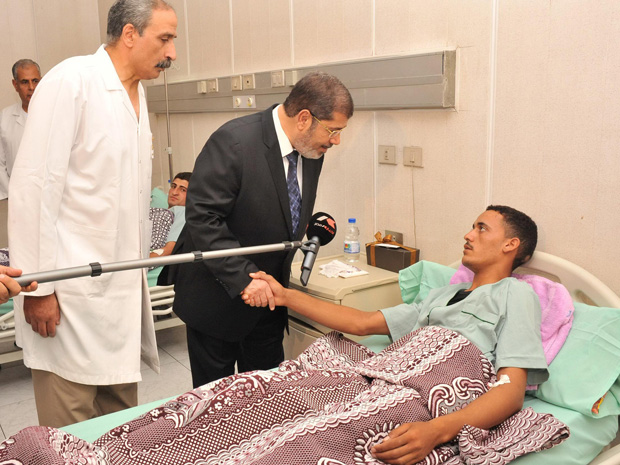
[President Morsi`s visit to the Badrashin accident victims who had been transported to the Maadi Military Hospital.
Only state media and press were invited to cover the visit. Photo by Egypt Presidency]
On the second anniversary of the Day of Rage, 28 January 2011, when Egypt’s uprising reached a crescendo that permanently changed the political map of the country, it feels like derailment is less of symptom of the railway sector, and more of a condition afflicting the state. As its institutions stubbornly cling to corruption and approximation, its new leaders are setting new standards of negligence, incompetence, and disingenuous political posturing. It seems today’s authorities are more concerned with varnishing their image than developing a systematic plan to change. Attempting, in any way, to deviate attention away from its disastrous mismanagement of both the country and national tragedies, the government’s “mothership,” the Muslim Brotherhood, has often resorted to distraction through divisive identity politics and sectarianism. On the frequent train accidents, various Muslim Brotherhood members and affiliated groups have openly alluded to these tragedies being intentional acts by Christians. More recently, the Brotherhood has also described the Black Bloc, a newcomer to the Egyptian protest scene fashioned after similar anonymous dissident groups worldwide, as a Christian militia.
However, the Black Bloc are not divorced of Egypt’s railways, not because of the false claim that they share a confessional faith with the train drivers, but rather because their first actions alongside the Ultras and other groups were largely focused on blocking train traffic in the country. On several occasions, two days before the 25 January anniversary, and the three consecutive days leading up to the Day of Rage memorials, the Black Bloc placed their bodies on the train tracks and brought the railroads to a standstill. Similar revolutionary groups closed down several metro lines and blocked traffic on 6 October bridge and other arteries in the country.
As battles rage on in Port Said, Suez, Cairo, Alexandria, and elsewhere for more reasons than can be overviewed here, there is a general sentiment that the country’s revolution is not only outside the offices of power, it has been irreparably derailed. The myriad forms of civil disobedience occurring across the country today, which President Morsi vowed to decisively counter, speak to more than a commemoration of a bygone era of tyranny. In no mood to celebrate, Egyptians are revolting against political monopolization, the continuation of a defunct economic policy, an empty state discourse of embellishment, the radical deprofessionalization of the public service sector, and, of course, the country’s “trains of death.” Two years have passed since anger swept the country and shook the world. With Morsi in the driver’s seat, the so-called “renaissance train,” what the Muslim Brotherhood often calls its multi-faceted modernization project, is now no more than a sick joke. Little remains of this misnomer besides twisted irony and, in response, depressing satire. In Egypt’s streets today, curfews are being violated, reinstated emergency laws are being ignored, and the state’s overt threats seem to intimidate no one. While the government accuses protesters of derailing the country’s progress and development, it is evident to most that it was Morsi who had driven this train off the tracks.
All photographs from Badrashin taken by Jonathan Rashad
![[The inside of a destroyed train car following its derailing at Badrashin. Photo by Jonathan Rashad]](https://kms.jadaliyya.com/Images/357x383xo/Train_derail.jpg)












